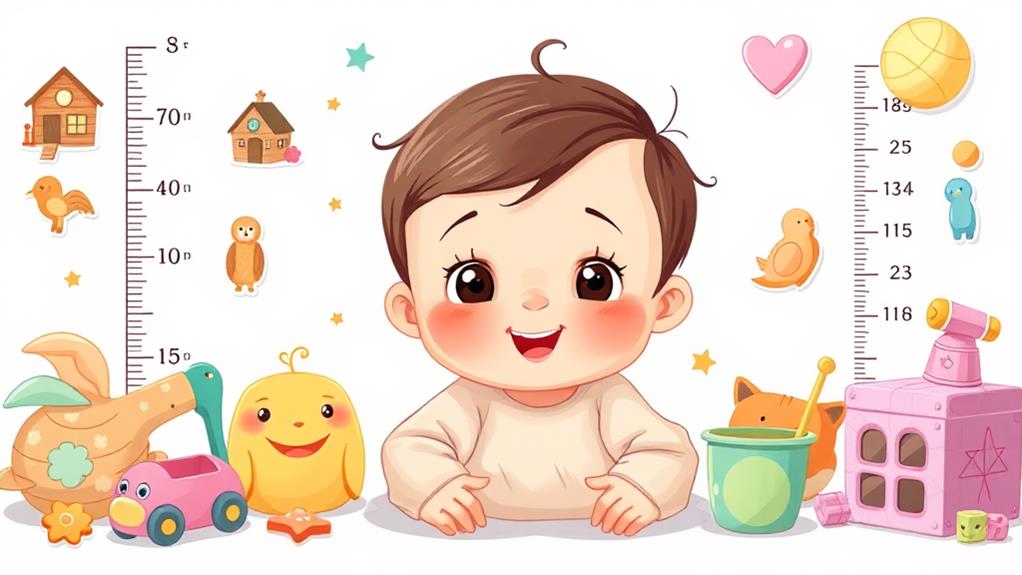If you're experiencing painful breastfeeding, it's essential to understand the underlying causes that might be affecting your experience. Factors like poor latch and nipple damage can create significant discomfort, but that's just the beginning. Physical issues such as engorgement and infections like thrush can add to your struggles, while emotional aspects like stress often go unnoticed. By identifying these potential culprits, you can take steps to improve your situation, but you might be surprised by how many factors could be at play. What's the most common mistake mothers make when addressing these issues?
Poor Latch Technique

One major reason for painful breastfeeding is a poor latch technique. When your baby doesn't latch on properly, it can feel like you're trying to squeeze a watermelon through a keyhole—ouch! A good latch means your baby takes in not just your nipple, but also a good portion of the surrounding areola. If they're only nibbling on the tip, you're in for some discomfort.
To get that perfect latch, start by positioning your baby tummy-to-tummy with you. You can hold them close, so they feel secure. Bring your baby to your breast, not the other way around; it's like trying to eat a sandwich while standing on your head—pretty tricky!
When your baby opens their mouth wide, quickly bring them to your breast. You want to see their lips flanged out, like little fishy kisses.
If you feel pain while they're feeding, gently break the latch by inserting your finger into the corner of their mouth. Don't worry; practice makes perfect! With a little patience and the right technique, you'll be on your way to a much more comfortable experience.
And remember, you're not alone—many moms face this challenge!
Nipple Damage
During the early weeks of breastfeeding, nipple damage can become a significant source of discomfort. You might notice cracks, soreness, or even bleeding, which can make feeding feel like a battle. But don't worry, you're not alone, and there are ways to help heal those sore nipples!
First, check your baby's latch. A poor latch can cause all sorts of issues, so make sure your little one's mouth covers most of your areola. If things feel off, try repositioning your baby until it's comfortable. It might take a few tries, but it's worth it!
Also, let those nipples breathe! After each feeding, consider air-drying them for a few minutes. This can help speed up healing. You can also use lanolin cream to soothe the soreness. Just remember, it's safe for your baby, so you can apply it without worry.
Lastly, if you're feeling really overwhelmed, don't hesitate to ask for help. Reach out to a lactation consultant or a supportive friend. You're doing an amazing job, and with a little care, those sore nipples can become a thing of the past!
Engorgement Issues

If nipple damage isn't enough of a challenge, engorgement can add another layer of discomfort to your breastfeeding journey. Engorgement happens when your breasts become too full of milk, making them feel tight and painful. It can feel like you're carrying around two bowling balls! Your breasts might even look larger than usual, and it can make breastfeeding tricky.
So, what can you do about it? First, try to nurse your baby more often. The more your baby eats, the less milk builds up. If your little one isn't hungry, you can pump a little milk to relieve the pressure. Just remember, you want to avoid pumping too much, or your body might think it needs to produce even more milk!
Warm compresses can help soothe the pain, and cold packs after nursing can reduce swelling. Also, wearing a supportive bra can make a difference.
Engorgement can feel overwhelming, but you're not alone! Many moms experience this and find ways to manage it. Just hang in there, and soon enough, your body will adjust to your baby's needs. You're doing great, mama!
Thrush Infection
Have you noticed a burning sensation or unusual discomfort while breastfeeding? If so, it might be a sign of thrush infection. Thrush is a yeast infection caused by an overgrowth of Candida, which can affect both you and your baby. It's like that annoying guest who won't leave, popping up when you least expect it.
You might feel sharp pain during feedings, and you could see white patches inside your baby's mouth. If your nipples look shiny or have cracks, that's another clue. Thrush can be tricky because it often comes and goes, making you wonder if it's really there.
Don't panic! You can tackle this issue. First, check with your doctor. They can give you antifungal treatments that work wonders.
Also, keep your nipples dry and clean to prevent the yeast from thriving. Remember to wash your hands frequently, too – it's not just for your baby's sake, but yours as well!
Taking care of thrush means you can get back to those cozy breastfeeding moments without the pain. So, keep an eye out, and don't hesitate to seek help! You've got this!
Mastitis Symptoms

Mastitis can hit you hard, causing pain and discomfort that make breastfeeding feel like a challenge. You might notice a few telltale signs that something's not right.
First off, you could feel a painful lump in your breast. It might feel like a marble hiding under your skin, and trust me, it's not pleasant. Along with that, you might've some redness or swelling in the area. It can feel warm to the touch, almost like a mini hot spot on your breast.
Don't forget about the fever! You might find yourself feeling a bit under the weather, with chills and an overall yucky feeling. Some moms even report feeling tired or a little achy all over. It's like having the flu, but with the added bonus of sore breasts.
If you notice these symptoms, don't hesitate to reach out to your doctor or a lactation consultant. They can help you figure out the best course of action.
Tongue Tie
When your baby has a tongue tie, breastfeeding can become a painful experience for both of you. A tongue tie happens when the band of tissue under your baby's tongue is too short or tight. This makes it hard for them to latch properly. You might feel pinching or sharp pain during feedings, and your baby may seem frustrated or struggle at the breast.
You might notice signs like clicking sounds while your baby feeds or not gaining weight as expected. It's like trying to drink from a straw that's kinked — not much fun, right?
Don't worry, though! Tongue tie can often be fixed easily. A healthcare provider can check your baby and suggest options, which might include a simple procedure to release the tight tissue.
Once that's done, many moms notice a big difference. After the procedure, it may take a little time for your baby to adjust, but with some practice, breastfeeding can become a lot more comfortable.
Breastfeeding Position

Choosing the right breastfeeding position can make a significant difference in your comfort and your baby's ability to latch effectively.
Let's face it, finding that perfect spot can feel like a game of hide-and-seek! You want to guarantee your baby's head is aligned with your breast, so they can latch on easily and suck without any struggle.
One popular position is the cradle hold, where you hold your baby across your lap, supporting their neck and back. This one's cozy and feels natural for many moms.
Another option is the football hold, where you tuck your baby under your arm, like a football—hence the name! This can be especially helpful if you've had a C-section.
You might also try the side-lying position, which lets both of you relax while breastfeeding, perfect for late-night feedings.
Whichever position you choose, make certain you're comfortable too! Use pillows for support and adjust your baby so they're close to you.
Stress and Anxiety
Stress and anxiety can greatly impact your breastfeeding experience, often leading to painful sessions for both you and your baby. When you're feeling anxious, your body might tense up, making it harder for your little one to latch on properly. It's like trying to hug a cactus—ouch!
Plus, stress can affect your milk flow, leaving your baby frustrated and you feeling even more overwhelmed.
So, what can you do to ease this tension? First, try to create a calm environment when it's time to breastfeed. Soft music, cozy blankets, or even some quiet time can make a big difference.
Take a few deep breaths and remind yourself that it's okay to feel what you're feeling. You're doing a great job!
If you notice that stress and anxiety are becoming a regular part of your breastfeeding routine, consider talking to someone about it. Whether it's a friend, family member, or a professional, sharing your feelings can lighten your load.
Hormonal Changes

Hormonal changes play a significant role in your breastfeeding experience, often leading to discomfort or pain. When you give birth, your body goes through a whirlwind of hormonal shifts. These changes can affect everything, from your milk production to how sensitive your breasts feel.
You might notice that your breasts are more tender, especially in the early weeks. This can make feeding your little one a bit uncomfortable, to say the least!
Hormones like prolactin and oxytocin are your breastfeeding buddies, helping with milk flow and bonding. However, when their levels fluctuate, it might cause your nipples to feel sore or tender. If you're feeling like a pin cushion, you're not alone! Many moms experience this, especially during the first few weeks as your body adjusts.
It's essential to keep a close eye on how you're feeling. If the pain doesn't ease up or you notice any unusual symptoms, don't hesitate to reach out to a healthcare provider.
They can help you figure out what's going on and get you back to enjoying those precious moments with your baby without the ouch factor! Remember, you've got this mama!
Infant Feeding Preferences
When it comes to infant feeding preferences, your baby's choices can significantly impact your breastfeeding journey. Every baby is different, and some might prefer the comfort of breastfeeding while others may show interest in a bottle or even solid foods sooner than you expect.
It's important to pay attention to what your little one seems to favor, as it can help you adapt your approach to feeding.
If your baby prefers breastfeeding, that's wonderful! But if they're more inclined toward a bottle, don't worry; it's pretty common. Babies can be picky, much like adults at a buffet, and sometimes they just want to try everything.
This can lead to a bit of a tug-of-war between you and your baby, especially if they seem less interested in breastfeeding during certain times.
Keep in mind that their preferences can change frequently. Just when you think you've got it figured out, they might switch things up on you!
Staying flexible and open to their choices will help make the experience smoother and more enjoyable for both of you. Remember, it's all about finding what works best for your little one and you!




